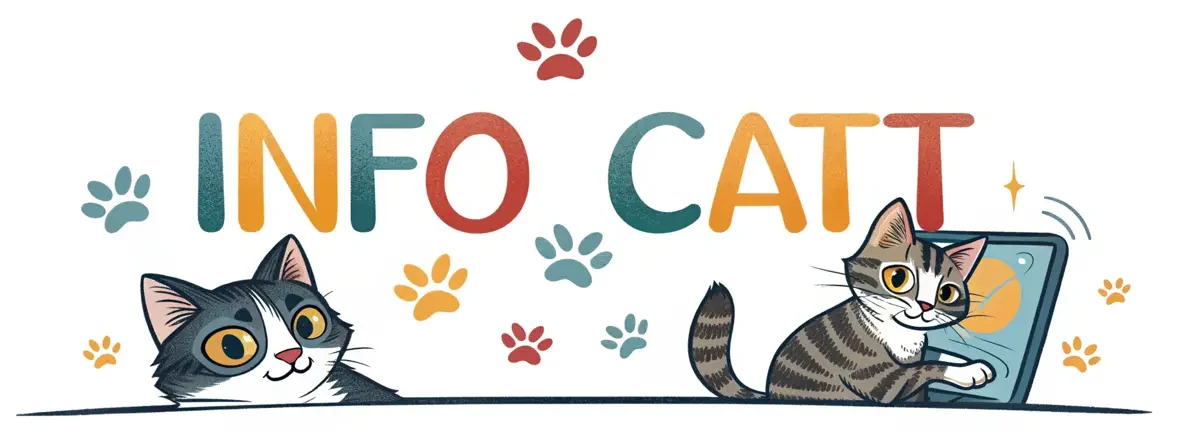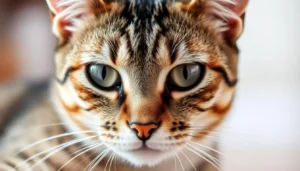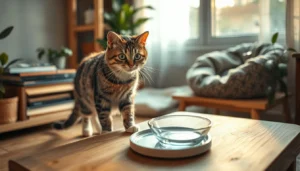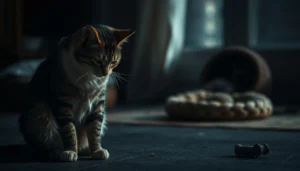Ever looked at your cat and worried when they barely eat? Their once eager eyes now seem disinterested. Cat appetite loss worries pet owners, making them question their cat’s health.
Figuring out why your cat eats less is like solving a mystery. Cats have complex ways of showing what they feel. Their appetite drop could mean anything from stress to serious health issues. This guide will look at five unexpected reasons for your cat’s eating changes.
Your cat’s eating less is not random. It’s a sign they might be feeling or sensing something. By paying attention and understanding these factors, you can help your cat eat better and stay healthy.
Understanding Normal Cat Eating Patterns and When to Worry
Every cat owner has worried when their cat won’t eat or doesn’t finish food. Knowing your cat’s eating habits helps you tell normal behavior from health issues.
Cats have their own eating patterns, influenced by many factors. It’s key to know what’s normal for your cat’s health.
Signs of Healthy Eating Habits in Cats
A Healthy Cat Eats Regularly And Enthusiastically. Look for these signs:
- Regular meal times
- Consistent portion consumption
- Enthusiastic approach to food
- Maintaining a stable weight
What Constitutes a Concerning Change in Appetite
Changes in eating habits are a red flag. Watch for these signs:
- Sudden loss of appetite
- Leaving food untouched for more than 24 hours
- Dramatic weight loss
- Visible discomfort while eating
The Impact of Age on Eating Habits
Your cat’s appetite changes with age. Kittens need frequent, nutrient-rich meals. Senior cats might eat less due to health or metabolism changes.
Remember, every cat is unique. What’s normal for one might be unusual for another.
If your cat consistently doesn’t finish food or shows no interest, see a vet. This helps rule out health problems.
Medical Conditions That May Cause Your Cat to Eat Less
If your cat is eating less, it might be a sign of a health issue. Knowing why cats stop eating is key to their health.
Cats often hide when they’re sick. So, if they start eating less, it’s a big warning sign. Many health problems can make cats lose their appetite.
Digestive Challenges That Disrupt Eating
Digestive issues can really cut down a cat’s appetite. Some common problems include:
- Gastritis causing stomach inflammation
- Inflammatory bowel disease
- Parasitic infections
- Gastrointestinal blockages
Dental Pain and Oral Discomfort
Dental problems can make eating painful for cats. Tooth decay, gum disease, and oral infections can hurt every time they eat, leading to less food.
Serious Systemic Diseases
Some serious health issues can also affect a cat’s appetite:
- Kidney disease
- Liver disorders
- Cancer
- Thyroid complications
If your cat is eating less, see a vet right away. Early treatment can greatly improve their health.
Why Is My Cat Not Eating As Much: Environmental Factors
Your cat’s eating habits can change due to environmental shifts. These small changes in their surroundings might cause eating problems. It’s important to know how to help your cat eat well during these times.
Cats love routine and predictability. Big changes in their environment can affect their appetite. Some things that might make your cat eat less include:
- Moving to a new home
- Introducing new pets or family members
- Loud construction or neighborhood noise
- Significant furniture rearrangements
- Sudden temperature or seasonal changes
To help your cat eat better, make their eating area calm and consistent. Choose a quiet spot for feeding away from busy areas. Use familiar bowls and keep feeding times regular to make your cat feel secure.
Cats need stability to feel comfortable eating, so minimize sudden environmental changes whenever possible.
If your cat’s eating problems last, slowly introduce changes and watch how they react. Keeping things calm, regular, and stress-free can help your cat eat better during tough times.
Behavioral and Emotional Reasons for Decreased Appetite
Cats are very sensitive and their eating habits can change based on how they feel. If your cat isn’t eating as much, it might not just be a physical problem. Emotional and behavioral issues can really affect their appetite.
Your cat’s mental health is very important for their appetite. Emotional problems can make them lose interest in food. It’s key to understand the behavioral reasons behind this.
Stress and Anxiety Triggers
Cats can get stressed in ways you might not expect. Common things that can upset them include:
- Loud noises like construction or thunderstorms
- New household members or pets
- Changes in family dynamics
- Unfamiliar visitors
Changes in Routine and Environment
Cats like things to be the same. If your cat isn’t eating as much, it might be because of changes like:
- Moving to a new home
- Rearranging furniture
- Alterations in feeding schedules
- Introducing new feeding locations
Social and Territory-Related Issues
Issues with other pets or feeling threatened can really affect your cat’s appetite. Conflict with other pets or feeling like their space is being invaded can make them not want to eat.
Knowing about these emotional and behavioral factors can help you fix your cat’s appetite loss. Creating a calm and stable place and giving them emotional support is important. This helps them keep a healthy eating routine.
Conclusion
Figuring out why your cat won’t eat is the first step to help them eat again. Many things can stop your cat from eating, like health issues or stress. Watching your cat closely and taking action early is key.
Being patient is crucial when your cat doesn’t want to eat. You might need to try different things, like changing the food’s texture or warming it up. Every cat is different, so it might take some time to find what works best.
If your cat keeps not wanting to eat, see a vet. They can check for health problems and suggest the best food for your cat. Getting help from a vet is important if your cat’s appetite doesn’t come back quickly.
Keeping your cat healthy means watching their diet and acting fast. By paying attention and being quick to respond, you can keep your cat happy and healthy.
FAQ
How long can a cat go without eating?
Cats should eat every 24-48 hours. If your cat skips a meal for more than a day, see a vet. Not eating enough can cause serious health problems like liver disease.
Could stress be causing my cat to eat less?
Yes! Cats can get stressed and lose their appetite. Stressors include moving, new pets, or loud noises. These changes can affect their eating and health.
What are some home remedies to encourage my cat to eat?
Warm wet food to make it smell better. Use fresh, high-quality food and shallow dishes. Try different flavors and textures. Hand-feeding or adding low-sodium chicken broth can also help.
When should I be really worried about my cat’s reduced appetite?
Be worried if your cat loses weight, seems tired, vomits, or has diarrhea. If they eat less for more than 24-48 hours, seek vet help. Also, watch for changes in drinking or sudden refusal to eat.
Could dental problems be causing my cat to eat less?
Dental issues can make eating painful. Look for signs like dropping food or pawing at their mouth. A dental check-up might be needed.
Are there specific health conditions that cause appetite loss?
Yes, many health issues can affect your cat’s appetite. These include kidney disease, thyroid problems, diabetes, cancer, and digestive disorders. These can cause nausea, pain, or changes in metabolism.
How can I tell if my cat’s reduced appetite is serious?
Watch for signs like significant weight loss, changes in water intake, or litter box habits. Also, look for lethargy, vomiting, or diarrhea. If you see these, it’s time to see a vet.



